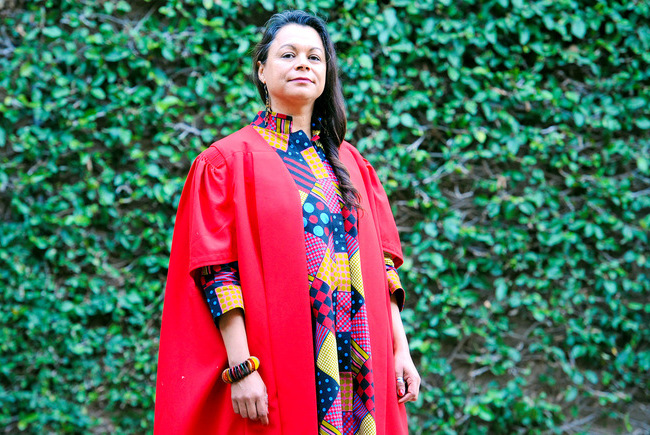Don’t profligate on defence: Here’s why
15 October 2024 | Story Kamva Somdyala. Photos Je’nine May. Read time 4 min.
Countries cannot splurge on defence mechanisms and infer that it leads to positive economic effects. This was front and centre of the University of Cape Town’s (UCT) Professor Eftychia Nikolaidou’s inaugural lecture, titled “Defence Spending: Drivers and economic effects”, delivered on 10 October at the School of Economics.
Professor Nikolaidou recalled how, while attending a conference in 1997, she was intrigued by discussions about corruption, vested interests and exaggeration of threats so that some groups could benefit from defence spending.
“It sounded familiar to me because in Greece, since I was a kid listening to news, the standard headline was ‘We need to spend more on defence because there are impending threats’ and at the time, Greece was still suffering from poor infrastructure, poor education and health systems so it made little sense to me,” Nikolaidou said.
“I then started working on my PhD, [which focused] on Greece and the economic effects of military spending and I had to compare with other countries like Spain and Portugal who were also spending a large amount on military spending without facing any threats.”
“You might not have the capability or the right personnel to use the high-tech machinery.”
Some of her research questions included:
- What are the economic effects of defence spending?
- How does military expenditure affect public debt?
- What are the political, economic and strategic determinants of military spending?
- Can high military spending by countries that do not face security concerns be justified on economic grounds?
Defence spending, according to Nikolaidou, should be determined “up to where the marginal benefit from security equals the opportunity cost”. This is a difficult task, however, given that countries cannot measure security threats, and they are difficult to forecast and prepare for. The glaring threat about spending big on defence is that it opens the door for provocation.
Nikolaidou noted that, “If you spend a lot of money on defence, that does not mean you are capable of using said military equipment. You might not have the capability or the right personnel to use the high-tech machinery. And there is the matter of maintenance.”
Drivers of defence spending
Drivers of defence spending come in different shapes and forms. They are both economic and strategic. “A nation’s security environment is determined primarily by the likelihood of conflict,” she explained.
Turning to where the debate about defence spending equals a vibrant economy, Nikolaidou said it can be traced to the work of Emile Benoit in the 1970s, who showed that military expenditure and development go hand in hand. “That provoked a lot of debate and disagreement and numerous econometric studies [were done] using different frameworks and models and methods. While the debate rages on, recently, the common finding is that military spending has either no significant effect on economic growth or a negative effect on economic growth, particularly in developing countries. Why? Because it crowds out investments in other growth promoting sectors,” she said.
“Drivers of defence spending cannot be understood purely on economic terms, still we should not neglect economic factors. Strategic factors are important, but very little evidence of an arms race interaction is available. The best way to model demand for defence spending is to integrate strategic, economic and political factors.
“What I can say with certainty is that there is very little support for any belief that military spending is a good way to stimulate the economy. The opportunity cost of defence is huge. So military spending is at best wasteful. The way to achieve security is through economic development,” added Nikolaidou.
Praise for her work
The dean of the Faculty of Commerce, Professor Suki Goodman, hailed Nikolaidou’s steadfastness in pursuing this body of work: “As an educator, she embodies a student-centred, student-focused pedagogy. She insists that her students actively participate in their learning journey, fostering an environment where inquiry and critical thinking thrive. Her teaching philosophy positions students as partners in learning, empowering independence and ownership, helping students how to learn, rather than dispensing information. While her research area is serious, and seriously unfunny, she brings a lightness to our collective, helps us laugh at ourselves and with each other.”
 This work is licensed under a Creative Commons Attribution-NoDerivatives 4.0 International License.
This work is licensed under a Creative Commons Attribution-NoDerivatives 4.0 International License.
Please view the republishing articles page for more information.
The UCT Inaugural Lecture Series
Inaugural lectures are a central part of university academic life. These events are held to commemorate the inaugural lecturer’s appointment to full professorship. They provide a platform for the academic to present the body of research that they have been focusing on during their career, while also giving UCT the opportunity to showcase its academics and share its research with members of the wider university community and the general public in an accessible way.
In April 2023, Interim Vice-Chancellor Emeritus Professor Daya Reddy announced that the Vice-Chancellor’s Inaugural Lecture Series would be held in abeyance in the coming months, to accommodate a resumption of inaugural lectures under a reconfigured UCT Inaugural Lecture Series – where the UCT extended executive has resolved that for the foreseeable future, all inaugural lectures will be resumed at faculty level.
Recent executive communications
2025
2024

Professor Susan Cleary delivered her inaugural lecture on 14 March.
14 Mar 2024 - 5 min read2023

Prof Lydia Cairncross’s inaugural lecture provided a snapshot of the career path of a surgeon and community activist whose commitment to social justice means her work doesn’t end in the operating theatre.
02 Nov 2023 - 8 min read2022

Professor Linda Ronnie is in UCT’s Faculty of Commerce.
28 Sep 2022 - 6 min read2021
2020
2019
2018
2017
2016 and 2015
No inaugural lectures took place during 2015 and 2016.


















































.jpg)


















